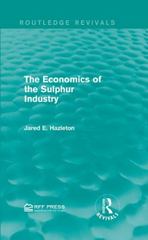Question
1.Countries where... a.investment is relatively unproductive should have current account deficits. b.investment is relatively productive should have current account surpluses. c.investment equals savings should have
1.Countries where...
a.investment is relatively unproductive should have current account deficits.
b.investment is relatively productive should have current account surpluses.
c.investment equals savings should have current account deficits.
d.savings are relatively large should have current account surpluses.
e.savings are relatively small should have balanced current accounts.
2.The "rules of the game" under the gold standard can best be described as which of the following:
a.selling domestic assets in current account surpluses and buying assets in current account deficits.
b.central banks in countries with current account surpluses seldom followed the rules in reality.
c.selling domestic assets regardless of current account balance.
d.banks with increasing gold reserves had a strong incentive to practice the rules.
e.buying domestic assets reverses or reduce gold outflows.
3.Against a fall in export demand,
a.fixed exchange rates are worse in mitigating the negative impact on the output than flexible exchange rates.
b.flexible exchange rates and fixed exchange rates are indifferent regarding the impact on the exchange rate.
c.the response of the output is positive and negative under fixed and flexible exchange rates, respectively.
d. a central bank does not adjust money supply under fixed exchange rates.
e. flexible exchange rates are better than fixed exchange rates only in the short-run.
4.Suppose you are offered a gamble in which you win $1,000 half the time but lose $1,000 half the time.
a.The expected value of this gamble is $500.
b.The expected value of this gamble is minus $500.
c.If you are a risk lover, you will not take this gamble.
d.If you are risk averse, you will take this gamble.
e.If you are risk neutral, you are indifferent to take this gamble.
5.Which of the following statements is the most accurate?
a.Bank failure is limited to banks that have invested in emerging economies' assets.
b.Bank failure is limited to banks that have invested in derivatives.
c.Offshore banking means the business that banks' offices conduct in domestic islands.
d.Dollar deposits located outside the U.S. are called Eurodollars.
e.Eurocurrencies are deposits denominated in the euro located outside the eurozone.
Step by Step Solution
There are 3 Steps involved in it
Step: 1

Get Instant Access to Expert-Tailored Solutions
See step-by-step solutions with expert insights and AI powered tools for academic success
Step: 2

Step: 3

Ace Your Homework with AI
Get the answers you need in no time with our AI-driven, step-by-step assistance
Get Started


